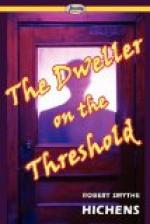“Quite another man, does he?”
“Yes. It’s very trying for the Hardings naturally. If it continues I think there will have to be a change. I don’t think things can go on as they are. My friend Sophia won’t be able to stand it.”
“You mean—the contrast?”
“Between her husband and Mr. Chichester. She’s very highly strung and quite worships her husband; though, between you and me, I think rather in the slave spirit. But some women are like that. They can’t admire a man unless he beats them. Not that Mr. Harding ever dreamed of doing such a thing to Sophia, of course. But his will had to be law in everything. You know the type of man! It’s scarcely my idea of what a clergyman should be. I think a man who professes to direct the souls of others should be more gentle and unselfish, especially to his wife. Another quail? Well, really, I think perhaps I will. They are so absurdly small this season, aren’t they? There’s scarcely anything on them.”
So that minute fraction of the world that knew of the existence of the Hardings began to utter itself concerning them, and Malling was fortified in his original belief which he had expressed to Professor Stepton.
Among his many experiments made in connection with psychical research those which had interested him the most had been those in which the mystery of the human will had seemed to be deeply involved. Malling was essentially a psychologist. And man was to him the great mystery, because man contained surely something that belonged to, that was lent to, man, as it were, by another, the mind beyond, the anima mundi. When Malling drew mentally, or spiritually, very near to any man, however rude, however humble, he always had the feeling that he was approaching holy ground. Hidden beneath his generally imperturbable exterior, sunk beneath the surface incredulity of his mind, there was the deep sense of mighty truths waiting the appointed day of proclamation. Surely, he often thought, if there is God in anything, in the last rays of the sunset, in the silence of night upon the sea, in the waking of spring among the forests and the gardens, in the song of the nightingale which knows not lovers are listening, there is God in the will of man.
And when he made investigations into the action of will upon will, or of will—as it seemed—upon matter, he was held, as he was not held by the appearance of so-called spirit faces and spirit forms, even when he could not connect these with trickery which he knew how to expose. Perhaps, however, his incredulity in regard to these latter phenomena was incurable, though he did not know it. For he knew nearly all the devices of the charlatans. And when the so-called spirits came, the medium was always entranced, that is, apparently will-less, and so to Malling not interesting.




